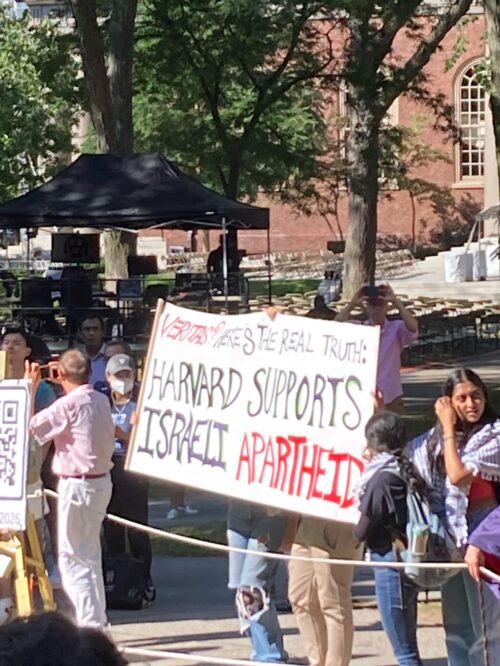Amid speeches, song, and instrument, the Harvard Palestine Solidarity Committee (PSC) gave a performance of their own at Convocation Ceremony last week. “Veritas? Here’s the real truth: Harvard supports Israeli Apartheid,” exclaimed a banner held by members of the student group as they chanted “free Palestine.” This demonstration corrupted a once-in-a-lifetime experience for many freshmen, who saw it as an attack on their identity at an event intended to welcome them into a new community.
PSC went even further on social media, accusing Harvard of being complicit with “ethnic cleansing” and attempting to create a dichotomy between the Jewish state and Harvard President Lawrence Bacow’s belief in “facing the truth when it is uncomfortable” and “justice, equity, and inclusion,” as he articulated during Convocation.
Yet these principles of liberal education are exactly what PSC themselves have neglected in their campaign, “Harvard Out of Occupied Palestine,” which calls for Boycott, Divestiture, and Sanctioning of Israel (BDS).
“I found the demonstration upsetting and in all respects contrary to the spirit of Convocation, a celebration of community and togetherness. Students want to feel safe at University-wide events,” expressed Isaac Ohrenstein ’26.
“It is so unfortunate that some students have abused the opening Convocation of this academic year with an anti-Israel—and, frankly, anti-Harvard—display,” Rabbi Jonah Steinberg, the executive director of Harvard Hillel, wrote in a recent email. “Perhaps the best use one may make of such a moment is to lift up—by contrast to what we have just seen in the Yard—the nuance and the depth available to Harvard students.”
“The PSC members turned this special community-building event into a self-promoting political show focused on them, spewing a message which was at worst propaganda and at best lacking nuance.”
Harvard Hillel organizes trips to Judea and Samaria/the West Bank for Jews and non-Jews alike to explore the region’s complexity, and Steinberg implored students to experience the regions firsthand. Close academic ties between Harvard and Israel have enabled “interaction among the peoples who compose Israel’s population” and “critical study regarding Israel’s abiding difficulties, its societal and geopolitical challenges,” which he described as crucial to Harvard’s mission.
At Convocation, members of PSC also made an effort to conflate their views and progressive politics, criticizing in both chants and an Instagram post about their performance Harvard’s financial involvement in “private prisons.”
PCS’s protest marked the continuation of the most visible period of anti-Israel rhetoric on Harvard’s campus in recent memory. During Israel Apartheid Week last April, PSC erected a wall, which garnered much media attention, expressing support for Palestinians. In social media posts and written statements after the end of last school year, PSC cited a shift in the campus climate brought about by the Crimson’s anti-Israel editorial, arguing that “it seems like now is finally the time” for divestment.
However, supporters of the Jewish state at Harvard, especially those new to campus, have in turn experienced a hostile campus climate. Leaving home to be unexpectedly accosted by an unsanctioned display that targets one’s identity and homeland makes the move to a radically new environment all the more so harder.
Every freshman has worked incredibly hard to be invited by the College to sit in those seats in Tercentenary Theatre. Yet the PSC members turned this special community-building event into a self-promoting political show focused on them, spewing a message which was at worst propaganda and at best lacking nuance. It is imperative that the conflation of anti-Israel sentiment and progressive politics does not lure our newest Harvardians into the folds of the BDS movement. I and many others stand strongly and fearlessly against hatred toward the world’s only Jewish state.
Alex Bernat ’25 (alexbernat@college.harvard.edu) is a sophomore in Lowell House concentrating in Computer Science and Electrical Engineering.

